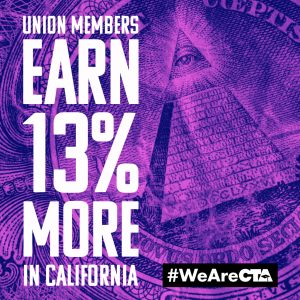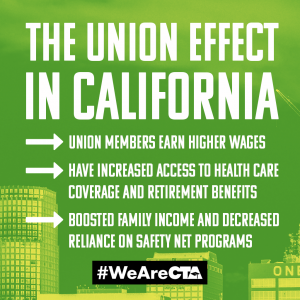Nov 02
Public TV Series – ‘Inside California Education’ – Deserves the Spotlight
The inside story behind challenging, critical issues in California’s public education began airing statewide earlier this year when PBS stations throughout the Golden State premiered Inside California Education. A recent featured program highlights Lincoln Elementary School in Sanger, where an exceptionally high number of special education students mix with the general education population – participating in everything from cheerleading to academics. Keep your eyes peeled because we’ll continue to share different segments in coming issues of the CTA Insider.
Nov 02
Speaking of CTA’s Advocacy Agenda …
… here’s a refresher on what it’s all about: CTA conducted extensive research and acquired input from thousands of educators to hone in on the most important topics that affect teaching and learning. The result was The Public Education All California Students Deserve, a document that outlines proven education strategies that improve and enhance student learning, are essential to providing a quality public education to all of California’s 9 million students, build stronger local communities, and help maintain public education as the cornerstone of our democratic society. Check it out – it’s yours to use and share!
Nov 02
Help replace musical instruments
The American Red Cross office in Santa Rosa has established a small team of volunteers to replace specific items lost by school students whose schools or homes have been damaged or destroyed. They are accepting musical instruments for the students for classes or orchestras throughout Sonoma County. The team is working with Santa Rosa City Schools as well as the Sonoma County Office of Education. For additional information or to donate, please contact Bob Berger at 415-652-0847, or email him at rzberger@yahoo.com.
Nov 02
Support for victims of the California fires
Our hearts and thoughts go out to the many students, fellow educators and families impacted by the fires that raged through California. In the Santa Rosa area alone, nearly 40 CTA members have lost their homes, with over 100 members losing their homes in several Northern California counties. In addition to Grants from CTA’s Disaster Relief Fund, and support for policy-holders from CTA’s endorsed insurance company, California Casualty, the Santa Rosa Teachers Association has started a YouCaring Fund, which has generated nearly $33,000 to date, and the Redwood Service Center Council has started a GoFundMe page with a goal of $20,000.




